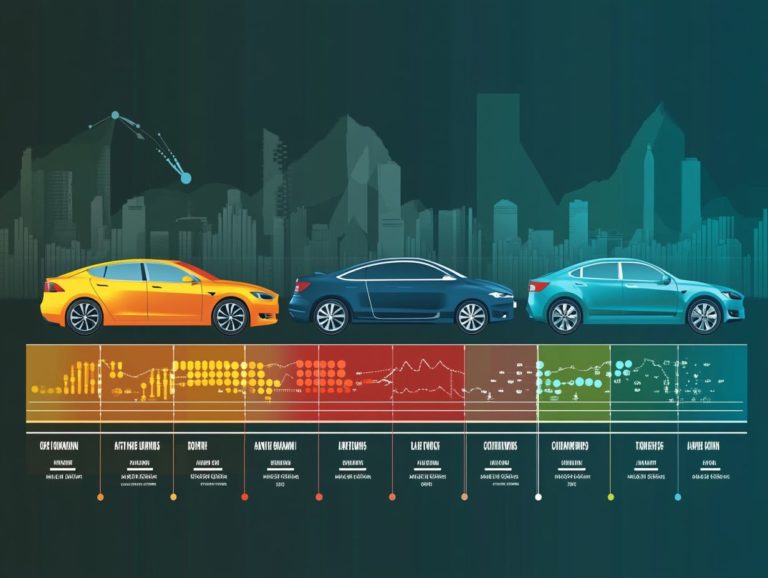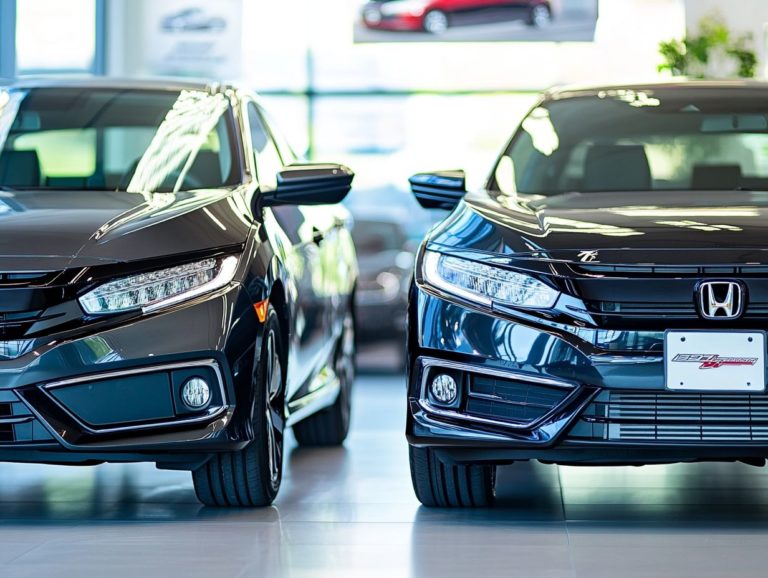Comparative Analysis: Gas vs. Electric Car Prices
As the automotive landscape evolves, the choice between gas and electric cars becomes increasingly significant for you as a consumer.
This article delves into various factors that influence car prices, from production costs to tax incentives that can sway your decision.
It offers a comprehensive comparison of the financial implications associated with gas and electric vehicles, considering both initial costs and ongoing operating expenses that affect your wallet in the long run.
Discover how electric and gas cars affect the environment while also considering practical matters such as charging infrastructure and driving range.
Navigate this critical decision-making process with us, empowering yourself as a modern driver to make informed choices.
Contents
- Key Takeaways:
- What Determines Car Prices?
- Cost Comparison of Gas and Electric Cars
- Environmental Impact of Gas and Electric Cars
- Other Considerations When Choosing Between Gas and Electric Cars
- Availability of Charging Stations
- Driving Range and Convenience
- Frequently Asked Questions
- What is a comparative analysis?
- What is the difference between gas and electric cars?
- Which is more expensive, a gas or electric car?
- What are the benefits of an electric car?
- What are the benefits of a gas car?
- Which type of car is better for the environment?
Key Takeaways:
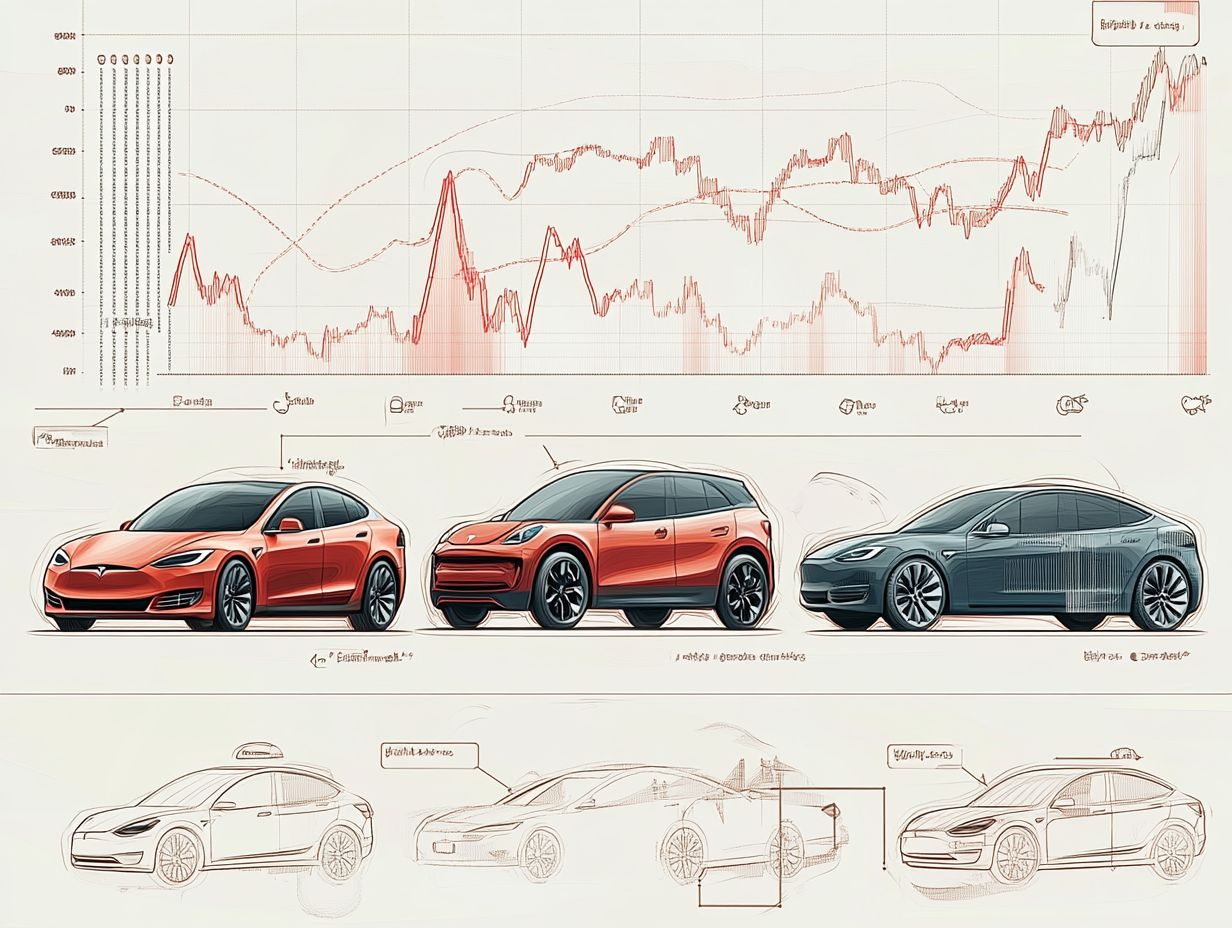
- Gas cars generally have a lower initial purchase price compared to electric cars, but long-term operating costs for electric cars can be significantly lower due to lower fuel and maintenance costs.
- Tax incentives and rebates can greatly reduce the cost of purchasing an electric car, making them a more affordable option in the long run.
- While gas cars have a negative impact on the environment through carbon emissions and pollution, electric cars are a more environmentally friendly option with lower long-term effects on the environment.
Overview of Different Types of Cars
The automotive landscape is becoming increasingly diverse, presenting you with many options tailored to various preferences and needs. From electric vehicles to traditional gas cars, each type brings its unique benefits and drawbacks.
As technology continues to evolve, you ll notice a rise in electric options like the Tesla Model Y and Nissan Leaf, while classic vehicles still hold their ground with models such as the Honda Civic and BMW 330i. Plug-in hybrids combine gas and electric power, serving as a bridge between conventional gasoline vehicles and fully electric alternatives.
This rich variety includes SUVs, sedans, and trucks, each designed with distinct characteristics to suit different lifestyles. For example, the Ford F-150 Lightning showcases how electric trucks are redefining capability, while hybrid contenders like the Toyota RAV4 blend fuel efficiency with spacious practicality.
In the luxury segment, electric powerhouses such as the Lucid Air offer a premium experience without the emissions, catering to those who seek both elegance and sustainability. On the other hand, gas cars provide immediate refueling capabilities and a broader spectrum of performance options, appealing to driving enthusiasts who cherish dynamic experiences.
As these options expand, your decision-making process becomes more informed, reflecting your individual priorities in sustainability, performance, and convenience.
What Determines Car Prices?
Several factors significantly influence car prices, affecting both electric vehicles and gas cars alike. For instance, comparing electric vs. gas performance can shed light on how production costs, market demand, and economic conditions shape consumer purchasing behavior.
You may notice that the average cost of electric vehicles has experienced fluctuations, often driven by advancements in battery technology and the availability of federal tax credits. For those considering a purchase, a luxury electric vehicles price comparison can provide valuable insights. Meanwhile, traditional gasoline vehicles are also subject to influences such as fuel prices and maintenance costs.
Understanding these dynamics can provide valuable insights into the automotive market. Consider your options carefully to choose the right car for your needs.
Cost of Production
Battery technology greatly influences electric vehicle production costs. It affects not just the upfront expenses but also the long-term savings you can enjoy through energy efficiency and lower maintenance.
As manufacturers optimize production processes and cut costs, factors like government incentives for example, federal tax credits play a crucial role in pricing.
These incentives can reduce the initial investment for you as a buyer, making electric vehicles a more attractive option compared to traditional gas-powered cars.
The fluctuating prices of essential raw materials for battery manufacturing, such as lithium and cobalt, also influence overall production costs. As electric vehicle technology progresses, reduced battery production costs could enhance their competitive advantage.
While gas vehicles might have lower starting costs, their dependence on fossil fuels makes them vulnerable to price swings and regulatory changes. For those considering alternatives, comparing prices of top electric vehicles in 2024 can provide valuable insights.
This creates a complex cost dynamic that you will need to navigate as a consumer.
Tax Incentives and Rebates
Tax incentives and rebates are essential for making electric vehicles more accessible to you. They significantly impact your overall ownership costs.
Policies like the Inflation Reduction Act offer federal tax credits for electric vehicle purchases, while local utility incentives further enhance affordability.
These financial benefits can lower the purchase price, encouraging you to consider electric vehicles as a practical alternative.
Various states also offer their own rebates and tax credits, alleviating your financial burden.
You could enjoy lower maintenance costs since electric vehicles have fewer moving parts than their gasoline counterparts.
In some regions, you can access additional perks like HOV lane privileges or reduced registration fees, making electric vehicle ownership not only economical but also convenient.
This combination of incentives plays a pivotal role in steering you toward more sustainable transportation choices.
Cost Comparison of Gas and Electric Cars
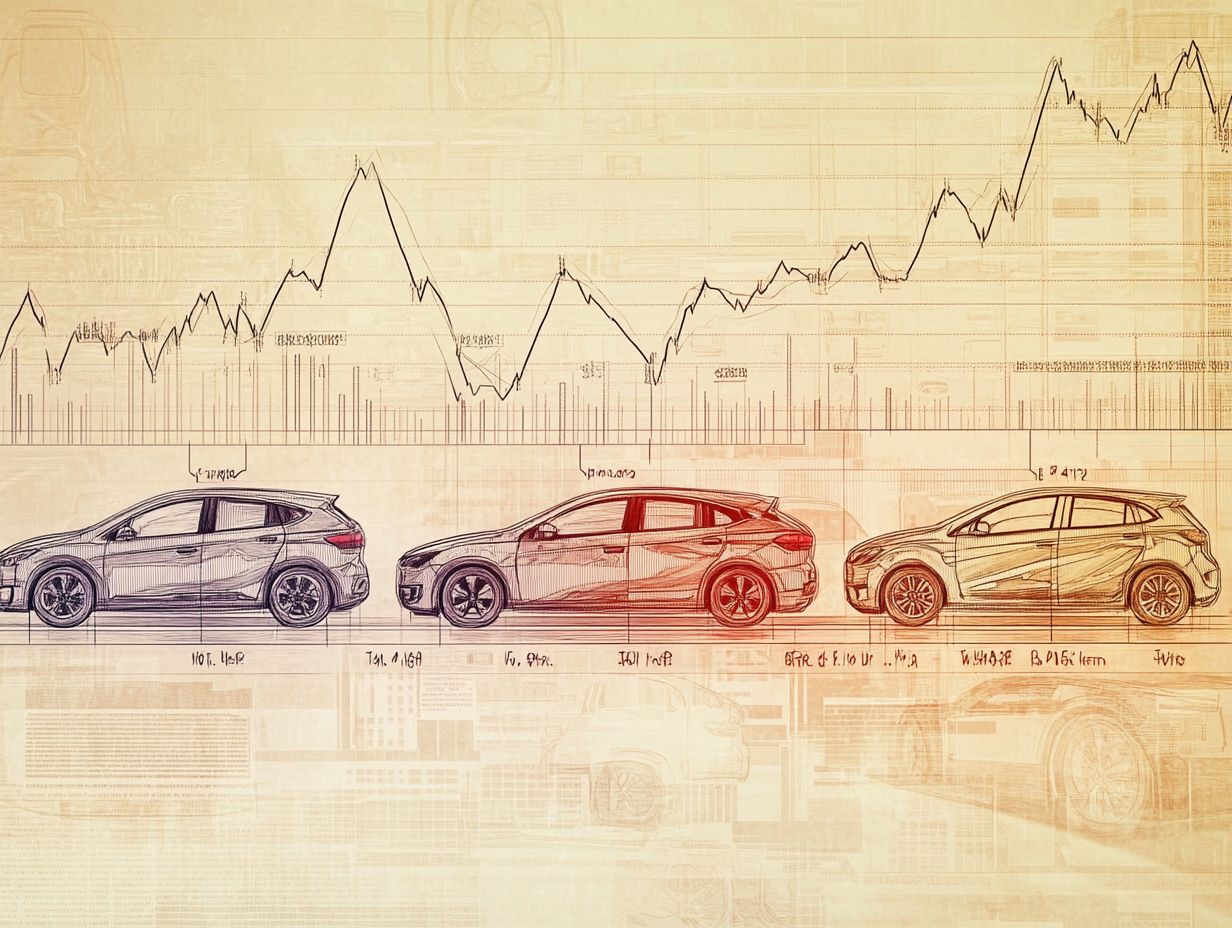
When contemplating vehicle ownership, you will find that feature analysis: gas vs. electric vehicle features unveils notable differences in overall expenses.
This comparison includes not only the initial purchase price but also ongoing costs like fuel and maintenance.
Electric vehicles often offer substantial long-term savings thanks to lower fuel expenses and reduced maintenance needs. However, their upfront costs may be higher than those of conventional gasoline vehicles.
Initial Purchase Price
The initial purchase price of electric vehicles often exceeds that of gas cars. This may give some consumers pause despite the long-term savings they can provide.
Several factors contribute to these price differences, including advancements in battery technology, market conditions, and regional variations in vehicle pricing.
The changing landscape of government incentives and rebates plays a crucial role in enhancing the accessibility of electric vehicles.
While the average cost of a new gas car tends to be lower, many consumers are increasingly considering energy efficiency and maintenance costs when making their choices.
As more manufacturers enter the electric vehicle market, competition is expected to drive prices down, making the shift from traditional gasoline-powered vehicles even more appealing.
Are you ready to explore the savings of owning an electric vehicle?
Operating Costs
Operating costs for electric vehicles present substantial advantages over traditional gas cars. This is primarily due to lower fuel costs and reduced maintenance expenses stemming from fewer moving parts.
You should also pay attention to charging costs and energy consumption, as these factors can fluctuate based on your region and local electric utility rates.
In many areas, you’ll likely discover that the price per kilowatt-hour for electric charging is significantly less than what you would spend on gasoline. Additionally, electric vehicles typically experience lower wear and tear, leading to infrequent repairs and less frequent tire replacements.
With charging stations becoming more common, many owners relish the convenience of home charging, allowing them to completely bypass gas stations. Although the initial purchase price of electric vehicles may be higher, the long-term savings on fuel and maintenance often yield favorable savings over time for environmentally-conscious consumers like you, who are eager to reduce overall vehicle expenses.
Environmental Impact of Gas and Electric Cars
The environmental impact of vehicles is a pivotal aspect of the discussion surrounding gas cars versus electric vehicles. Electric vehicles are frequently heralded as the cleaner alternative because they can reduce emissions.
However, it’s essential to recognize that while electric vehicles produce lower carbon emissions during operation, their overall environmental footprint is influenced by critical factors, including battery production and the sources of electricity used for charging.
Carbon Emissions and Pollution
Carbon emissions and pollution present significant environmental challenges for both electric vehicles and gas cars, highlighting their distinct impacts on air quality and climate change. While you might consider electric vehicles a cleaner alternative, the source of electricity used for charging plays a critical role in their overall environmental performance.
If the electricity originates from fossil fuels, the emissions tied to operating electric vehicles can undermine their environmental advantages. In contrast, gas cars burn fuel directly, contributing to air pollution and greenhouse gas emissions.
Research indicates that in regions with renewable energy sources, electric vehicles can greatly reduce overall carbon footprints compared to their gas-powered counterparts. Understanding the electricity sourcing for EVs is essential for making informed choices that align with your sustainability goals. This highlights the crucial role of green energy in mitigating transportation-related pollution.
Long-Term Effects on the Environment
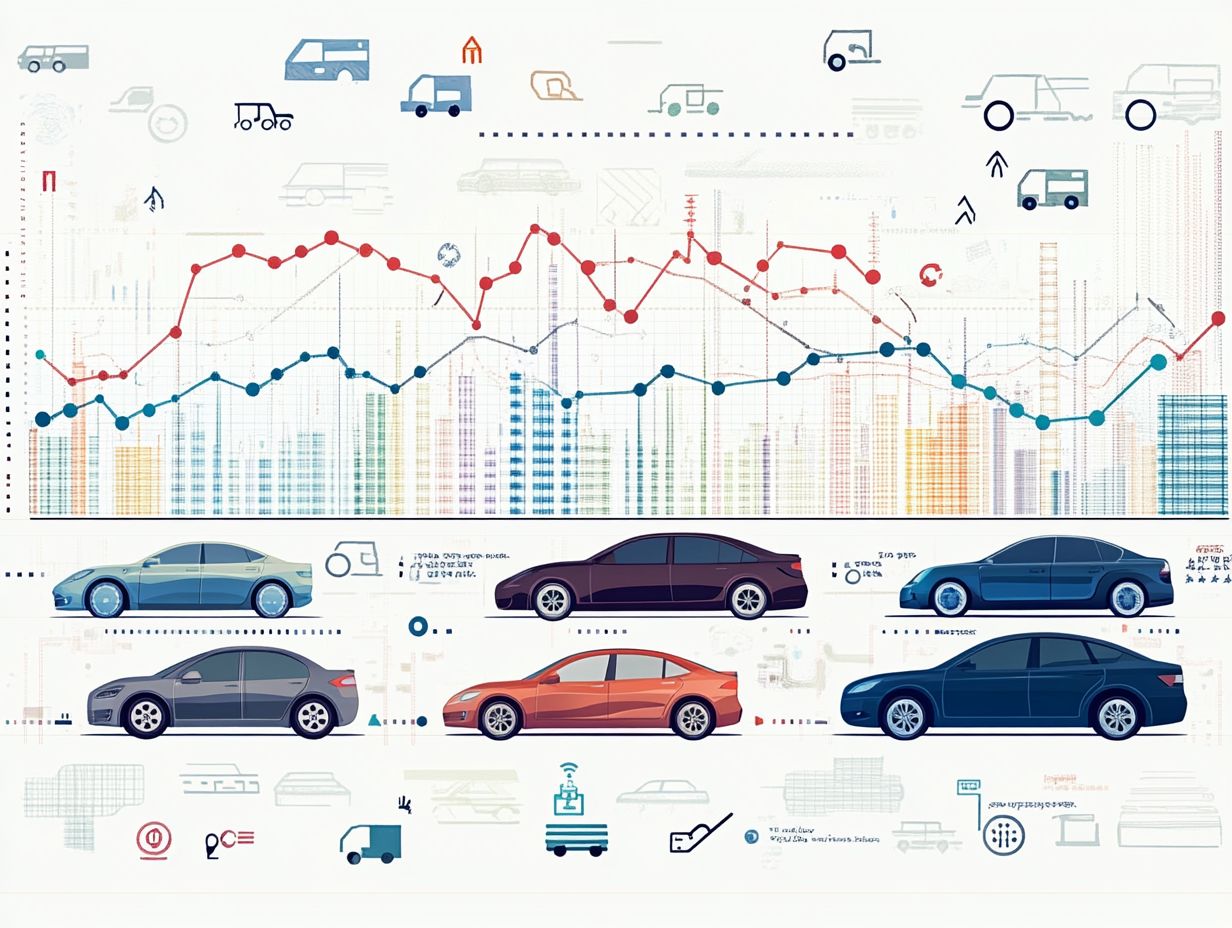
The long-term environmental impacts of electric vehicles compared to gas cars are at the forefront of the conversation about sustainable transportation solutions. Electric vehicles are exciting because they save energy and have the potential to significantly reduce harmful emissions over time.
However, it s crucial to consider their entire lifecycle impacts alongside traditional gasoline vehicles. This includes a thorough examination of battery resource extraction the process of getting materials to make batteries energy generation methods, and recycling processes, all of which profoundly affect overall sustainability.
When comparing the carbon footprints of both vehicle types throughout their operational life, you ll notice that while electric vehicles may present a higher initial environmental cost, they often provide substantial benefits in emissions reduction, especially when powered by renewable energy sources.
Advancements in battery technology are continually enhancing the efficiency and sustainability profile of electric vehicles, potentially bridging any gaps that exist with conventional combustion engines.
Other Considerations When Choosing Between Gas and Electric Cars
When choosing between gas and electric cars, you’ll find that several other factors come into play. Consider the availability of charging stations and the driving range of electric vehicles, as these can significantly impact your overall convenience. For a deeper understanding, check out this performance comparison: gas vs. electric.
It’s essential to weigh these elements against your lifestyle and daily commuting needs, especially as charging options and infrastructure continue to evolve.
Availability of Charging Stations
The availability of charging stations is crucial for electric vehicles. It directly impacts your confidence and convenience as a consumer.
With public charging infrastructure expanding, owning an electric vehicle is becoming more practical, especially in urban areas.
This development eases range anxiety and encourages more people to consider electric vehicles. Cities are investing in charging networks, including fast-charging options at shopping centers and along highways.
These advancements support a shift towards sustainable energy and appeal to environmentally conscious individuals.
By improving access to charging stations, manufacturers enhance your overall electric vehicle experience. This paves the way for a future where electric vehicles are a common choice for daily transportation.
Driving Range and Convenience
Driving range is key for evaluating electric vehicles versus gas cars. It affects your daily commute and travel plans.
Although battery technology has improved, many still feel range anxiety on longer trips.
This concern arises from not knowing where to find a charging station, unlike gas cars that refill in minutes. Many drivers prioritize the quick refueling experience of gasoline vehicles.
However, the growing network of charging infrastructure makes planning journeys easier. With rising availability of fast-charging solutions, electric vehicles are becoming more convenient than ever.
Frequently Asked Questions
What is a comparative analysis?
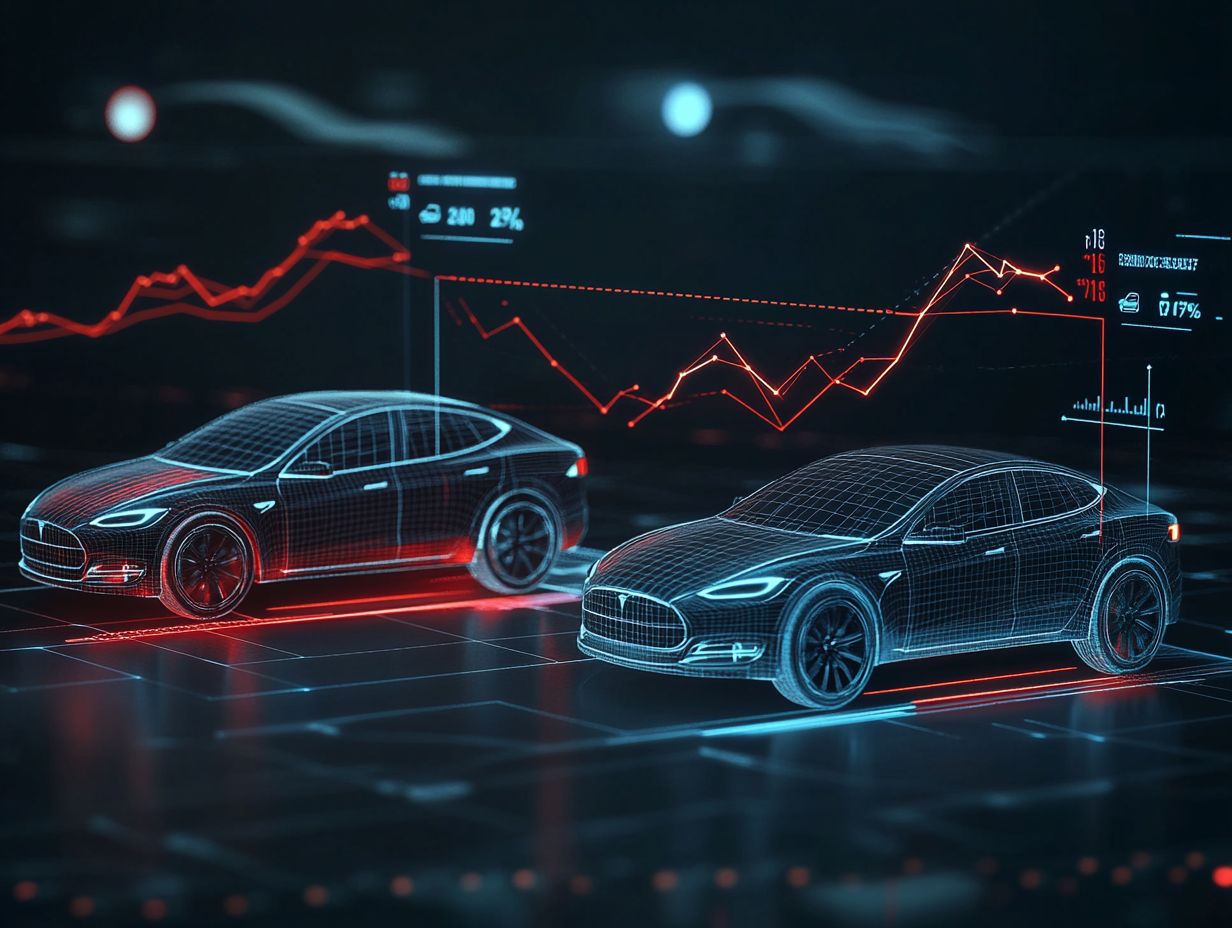
A comparative analysis compares two or more items based on specific criteria to find their similarities and differences.
What is the difference between gas and electric cars?
The main difference lies in the fuel source. Gas cars use gasoline or diesel, while electric cars run on electricity stored in batteries.
Which is more expensive, a gas or electric car?
Usually, gas cars are more expensive than electric cars. However, for a detailed breakdown of prices, you can refer to electric car costs, as costs vary based on make, model, and features.
What are the benefits of an electric car?
Electric cars offer lower operating costs and reduced emissions. They provide a smooth, quiet ride and don’t require gas, making them more environmentally friendly.
What are the benefits of a gas car?
Gas cars typically have a longer driving range and are more widely available at fueling stations. They are often more affordable upfront and refuel quickly, but for those considering alternatives, price comparison for eco-friendly vehicles can provide valuable insights.
Which type of car is better for the environment?
Electric cars are generally better for the environment due to their lack of emissions. However, the overall impact depends on how the electricity is sourced.



